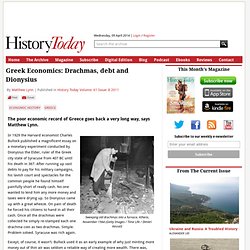

Low levels of labour mobility. One-size-fits-all monetary policy. Koo on German bubbles. Hard Times for the Elusive “Father of the Euro” Someday there’s going to be a biography of Robert Mundell, of Columbia University – in all likelihood, there will be more than one, because Mundell has been so elusive over the years.

Surely he is the only Nobel laureate who lacks a detailed curriculum vitae (his first twenty years were only a little less of a pinball carom than those of Thorstein Veblen.) At 80, the so-called “father of the euro” (and chief architect of “supply-side economics”) remains the same indistinct figure that he has been for sixty years, clearly in the picture but somehow just beyond the focal plane.
A recent case in point: “The MIT Family Tree,” a Bloomberg BusinessWeek charticle that was authoritative enough to be posted on the bulletin board of the economics department at the Massachusetts Institute of Technology. Housing bubbles and interest rates. In the aftermath of the recent global financial crisis, central banks have been widely criticised for having kept interest rates too low for too long.

Several authors have argued that exceptionally low interest rates spurred excessive risk-taking in the banking sector, leading to the build-up of imbalances and finally the crisis (see eg Ciccarelli et al 2011 or Altunbas et al 2010). Since property prices have been shown to play an important role during episodes of financial instability (see among others Goodhart and Hofmann 2007 and Bank for International Settlements 2004), understanding the link between monetary policy stance and the emergence of housing bubbles has become an important and topical issue for policymakers. In a recent study (Hott and Jokipii 2012), we analyse the role that monetary policy plays in the emergence of housing bubbles. How Germany can avoid a two-speed Europe.
George Soros | Financial Times | March 21, 2011 The “euro crisis” is generally seen as a currency crisis, but it is also a sovereign debt and, even more, a banking crisis.

The situation is complex. The complexity has bred confusion, and this has political consequences. Europe’s various member states have formed widely different views and their policies reflect their views rather than their true national interests. The clash of perceptions carries the seeds of serious political conflicts. The solution that is about to be put in place will, in effect, be dictated by Germany, without whose sovereign credit no solution is possible. Germany blames the crisis on the countries that have lost competitiveness and run up their debts, and so puts all the burden of adjustment on debtor countries.
When the euro was introduced it was expected to create convergence but it brought divergence instead. Two fundamental modifications are required. Source: Financial Times. Fighting (for?) Europe: How European Elites Lost a Generation - SPIEGEL ONLINE - News - International. When Kostas Dekoumes, a 24-year-old Greek, is asked about Europe, he launches into a rant about German Chancellor Angela Merkel.

When Oleguer Sagarra, a 25-year-old Spaniard, is asked the same question, he says that Europe represents the only chance to find work. Karl Gill, a 21-year-old Irishman, responds to the question by railing against the banks. And when Jacques Delors, 85, is asked about Europe, he says things like: "Europe needs a pioneering spirit," and he asks: "Do the men and women of this era truly want this Europe? " Delors, together with former French President François Mitterrand and former German Chancellor Helmut Kohl, was one of the driving forces behind the European Union, and under his leadership as president of the European Commission, treaties were signed that would be impossible to forge agreement on today. Greek Economics: Drachmas, debt and Dionysius. The poor economic record of Greece goes back a very long way, says Matthew Lynn.

Sweeping old drachmas into a furnace, Athens, November 1944 (Getty Images / Time Life / Dimitri Kessel)In 1929 the Harvard economist Charles Bullock published a magnificent essay on a monetary experiment conducted by Dionysius the Elder, ruler of the Greek city state of Syracuse from 407 BC until his death in 367. After running up vast debts to pay for his military campaigns, his lavish court and spectacles for the common people he found himself painfully short of ready cash. No one wanted to lend him any more money and taxes were drying up. So Dionysius came up with a great wheeze. On pain of death he forced his citizens to hand in all their cash. Except, of course, it wasn’t. EIP 1.0 – high time to address macroeconomic imbalances! The flaws of the EU’s asymmetric approach to imbalances. The Euro's PIG-headed masters. Europe is in constitutional crisis.

No one seems to have the power to impose a sensible resolution of its peripheral countries' debt crisis. Instead of restructuring the manifestly unsustainable debt burdens of Portugal, Ireland, and Greece (the PIGs), politicians and policymakers are pushing for ever-larger bailout packages with ever-less realistic austerity conditions. The governance of a fragile Eurozone.